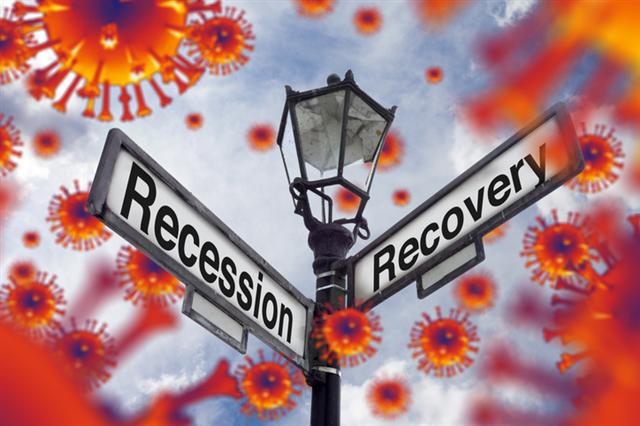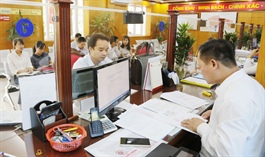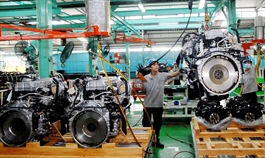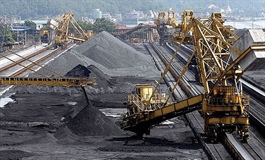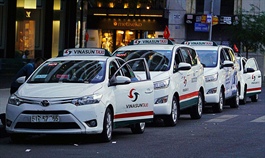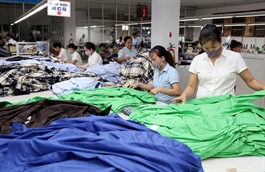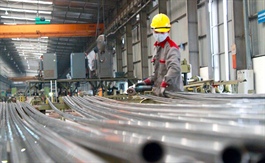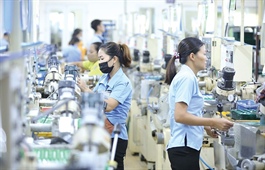Economic recovery faces unseen hurdles
Economic recovery faces unseen hurdles
The year 2020 marked an end of a tumultuous decade that was full of turbulent and unsettling events across the globe that affected the global economy in particular.
Illustrative photo.
|
The last ten years saw a long stretch of global recession caused by the financial collapse of Lehman Brothers in 2008, the subsequent public debt crisis in Europe, the unending US-China trade war, and now the current Covid-19 pandemic that has brought the entire world to a standstill. The last decade was undoubtedly a difficult one for all world economies, as well as for Vietnam, in many crucial ways.
Vietnam's economy was unavoidably affected by all global instabilities in the last decade. The banking system suffered greatly from mounting bad debts, a fall in the gold market, and a sluggish real estate. The countries growth engine has now consequently slowed down and investments are but trickling in.
Constant social distancing and an unceasing effort to contain and control the Covid-19 pandemic has collectively inflicted a fatal blow on markets, stocks, tourism and real estate businesses. There are very few new economic activities taking place across the country, with almost no optimistic sentiments for growth expectations in the near future. Although, the first few days of 2021 did bring a ray of hope of more economic growth, which now has once again been overtaken by pessimism.
Optimistic expectations
Even though the world economic growth map is almost entirely covered in red, Vietnam's economy in 2020 still grew at a rate of 2.91%, mainly due to its highly efficient and successful anti-pandemic proactive move, which was supported by comprehensive economic stimulus packages. The Government of Vietnam doled out these packages almost immediately after the pandemic broke out.
Although the stock market and the real estate market are both vulnerable to macro factors, the expectation of optimistic signals in 2021, low investment capital, a moderately running economy, are factors that have driven stock prices and real estate prices up again. Liquidity in the Ho Chi Minh City Stock Exchange has continuously been increasing, and even in many trading sessions the number of orders have exceeded capacity. Such large and continuously increasing trading volumes reflect a large amount of capital inflow. As a result, stock indices have also been on the rise. In the real estate market, several projects have been revived once again, housing prices are warming up, and there are signs that markets are reflecting optimistic expectations on asset prices of some investment channels.
For investors, the fact that the markets have started to regain a growth momentum has created a positive psychological effect. Some people feel this is the best time to change consumption patterns and investment behavior in a positive way. Businesses must now be motivated to relaunch projects and business plans. This will generate jobs, income, and improve consumer confidence. People will confidently spend money, including the savings they held on to during a difficult year, find investment opportunities, and get back into the markets.
Better macro-economic conditions will loosen financial conditions, lower risks, and banks will reduce lending, while disbursement conditions will become strong. During 2020 and the Covid-19 pandemic situation, asset prices of investment channels adjusted simultaneously. This made it easier for people to make investment decisions, and likely to make main investment channels continue to grow throughout 2021, which could also lead to a new asset price bubble cycle.
Possible macro instabilities
Even as the Covid-19 pandemic has taken a devastating toll on human health, so also many economic relief packages have created enormous pressure on the health of the economy. In the short term, such packages are a reasonable necessity. However, economic bailouts to prevent collapse of the economy and create macro stability comes at a very high cost. For example, the immediate emergency and pain relief drugs that are injected into a patient's body to help save a life leaves a long-term side effect on the body, which is forever painful.
Economic relief packages are a fiscal burden on the economy now. The huge amount of money pumped through different channels, mainly in the second half of 2020, to maintain a continuation of economic activities and bring about economic security, into production, trading and investment, is now under review whether it is being utilized effectively. However, enterprises need the time and the necessary factors to restore back production and revive and promote related activities. The economic sector that produces goods and physical assets, always reacts slowly and responses face many delays.
On the other hand, financial markets operate in just the opposite way. Financial transactions are quick in response and extremely flexible. In just one day, the stock market and similar channels can absorb large amounts of capital that sometimes all economic sectors can absorb. This is the root cause of asset price bubble. In the present circumstances, policy makers must pay attention to this. This fact has also created a dilemma in operating monetary policy this year. On the one hand, the State Bank of Vietnam still has to ensure loosening of financial conditions, keep interest rates low, clear capital flow to create favorable conditions for production, investment and consumption, and minimize financial friction.
When cheap capital and real investment take time to add value, speculation becomes rife. Cash flows into financial assets and transactions of buying and selling causes more speculation. The Government faces a dilemma this year, if the current situation is not brought under control. This then will slowly put strong pressure on inflation and exchange rate stability. Therefore, speculation must remain limited, prices must be stabilized, cash flow must be tightened, and then only can our resources restore the economy once again.


